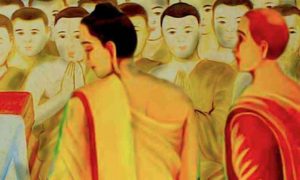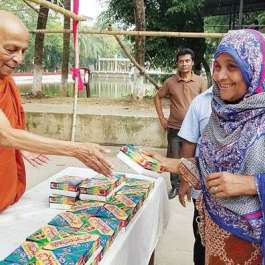Young Voices is a special project from Buddhistdoor Global collecting insightful essays written by high school students in the US who have attended experiential-learning-based courses rooted in the Buddhist teaching. Inspired by and running in parallel with BDG’s Beginner’s Mind project for college students, Young Voices offers a platform for these high school students to share essays expressing their impressions and perspectives on their exposure to the Buddhadharma and its relationship with their hopes, aspirations, and expectations.
Lesley Tan wrote this essay for her “Listening to the Buddhists in Our Backyard” class at Phillips Andover, a high school in Massachusetts. Lesley is from Irvine, California, and is studying philosophy and psychology in college.

Unraveling from Expectations
Looking at the gorgeous dining halls and dorm rooms I saw on the Phillips Academy website, I had imagined that my life here was going to be perfect. Nevertheless, I didn’t quite anticipate the pressures that have clouded my original conceptions. After four years at this boarding school, I often feel as though every student is competing to be the smartest, most accomplished, most sociable, and most attractive person on campus, driven largely by their ambition to gain acceptance into the best colleges in the world. This competitive culture shapes social hierarchies, and cliques form based on one’s proximity to the “ideal” Andover student, who is both extremely intelligent and sociable in the eyes of others. In my first couple years, I felt unworthy of the friendship of my peers. I didn’t feel intelligent, sociable, or attractive enough and so feared rejection. In response, I learned to make “useful connections” over genuine friendships, to “just get things done” instead of engaging in meaningful and impactful work. I’ve felt crushed under a constant pressure to conform to this image of the “ideal” Andover student without investigating the values I truly aspire to embody.
During the tumultuous period of the release of college acceptance decisions, I had the privilege of visiting Buddhist temples with a group of five of my fellow high school seniors, along with Andrew Housiaux, director of the Tang Institute, and Chenxing Han, author of Be the Refuge. Instead of taking five classes for the spring term, as is common for most other seniors, we opted into an experiential-learning program that substituted our regular course load. Every day for eight days, we visited Cambodian, Chinese, Thai, Tibetan, and Vietnamese temples across the Merrimack Valley. We spoke with monastics, laypeople, and scholars to learn about Buddhism through conversations and direct experience.
At the Vietnamese Tinh Vien Quan Am Pagoda, a nun emphasized to us: “No one has to do anything.” She went on to explain that she never imposes the Buddhist teachings on anyone, nor does she try to force others to visit the temple. There were nods and “mms” of agreement around me as we sat on patterned red rugs. At the end of our visit, the nun went to the altar that held a Buddha statue, glass lotus flowers, and gold trays neatly stacked with oranges. She gave each of us an orange, explaining that it is a Buddhist tradition for visitors to take fruit each time they leave the temple. I was struck by her generosity, offered without placing any expectation on us to reciprocate or change ourselves unless we were willing to engage in such a transformation. I pondered what it means to allow others and myself the space to be and become without so much external pressure.
At other temples I visited, I also encountered enormous generosity and felt free to accept myself as I am. At the Vietnamese temple Chùa Tường Vân Lowell, the abbot, Venerable Thích Tâm Hy, and the youth group organizer, Dr. Tham Tran, graciously welcomed us. Ven. Hy chanted Buddhist scriptures, and Tham translated lines of wisdom written on pieces of paper that we drew from a small gold container. They offered us tea, flan, and goji berries while sharing their personal histories. I received their generosity by simply being a person on this planet. I did not have to prove myself through grades or accolades to experience such kindness and acceptance from other people.
Immersed in these temples and teachings, I called into question my own values. Andover has influenced me to value personal achievement and social status above all else. However, the monastics and lay people I met and conversed with shared values that are often spoken of but rarely embodied in the competitive environment among my peers: genuine kindness and community. From offering wisdom to gifting oranges, I felt immensely inspired to reconsider my view of life as an individualistic pursuit, and instead refocused on creating meaningful connections and contributing to my communities.
Instead of comparing how I measured up to my peers in my accepted schools, I began to consider my intentions for college, which eventually helped me decide which school to attend—especially after reflecting on the nun’s words: “No one has to do anything.”
Instead of feeling pressured into choosing a school that others believe is more prestigious, I instead thought about which school would be the best fit for me. College then shifted away from being an aspect of identity that shapes how others might view my intelligence and social status, and toward being part of a future in which I can fulfill my newfound values of community and kindness.
In the end, I chose a less highly ranked school, but one that is a better fit. I have the wisdom gained from the Buddhist temple visits to thank for guiding me away from how I want others to perceive me and toward determining what I truly want to experience in the next four years of my life.
References
Han, Chenxing. 2021. Be the Refuge: Raising the Voices of Asian American Buddhists. Berkley, CA: North Atlantic Books.
Related features from BDG
The Power of Communal Learning
What to Do with Impermanence













